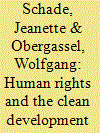|
|
|
Sort Order |
|
|
|
Items / Page
|
|
|
|
|
|
|
| Srl | Item |
| 1 |
ID:
137155


|
|
|
|
|
| Summary/Abstract |
The 2010 UN climate conference in Cancún emphasized that ‘Parties should, in all climate change related actions, fully respect human rights’. However, so far there is no further guidance. This article discusses the relevant legal human rights norms and two case studies from the Kyoto Protocol's Clean Development Mechanism (CDM). The first case (Bajo Aguán, Honduras) shows that the current absence of any international safeguards can lead to registration of highly problematic projects. The second case (Olkaria, Kenya) suggests that safeguards, introduced here as a side effect of World Bank involvement, can have a positive impact, but that it is necessary to have them based on human rights. It therefore seems recommendable that the UN climate regime develop mandatory human rights safeguards. In addition or alternatively, individual buyer countries or groups of countries, such as the European Union, could introduce their own additional requirements for CDM projects
|
|
|
|
|
|
|
|
|
|
|
|
|
|
|
|
| 2 |
ID:
137156


|
|
|
|
|
| Summary/Abstract |
The Alliance of Small Island States (AOSIS) encompasses more than 40 low-lying and island developing states that are among the most vulnerable but also most vocal parties in international climate negotiations. Over the years AOSIS's strategies comprised of the building of scientific expertise, and leadership by example, but also a particular framing that puts emphasis on multilateral processes to deal with issues of common concern and established principles of the international community. The initial assumption of the paper is that a frame alignment of climate change and human rights concerns would strengthen the coalition's moral and legal arguments. However, as a frame analysis of close to 50 coalition submissions and statements reveals, such a linkage is not established. The paper concludes by outlining three possible explanatory factors for this observation: the nature of the issue area, the character of the coalition and the professional background of AOSIS negotiators.
|
|
|
|
|
|
|
|
|
|
|
|
|
|
|
|
| 3 |
ID:
182596


|
|
|
|
|
| Summary/Abstract |
This study illustrates the interaction of international and domestic factors that influenced China’s stance in the climate negotiations from 1992 to 2015. After providing a historical overview of China’s climate diplomacy, it elaborates on the external and internal factors that have shaped China’s climate diplomacy. At the international level, it examines the pressures that China has faced from both developed and developing countries at the United Nations climate change conferences. At the domestic level, it analyses three factors—China’s political system, its energy scenario and its environmental non-governmental organisations—that pushed China to soften its traditional positions. It ends with an elaboration of the interface of the international and domestic factors that have driven China’s shift away from blunt rejection of mitigation responsibility.
|
|
|
|
|
|
|
|
|
|
|
|
|
|
|
|
|
|
|
|
|